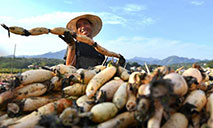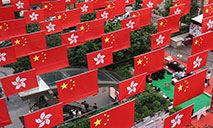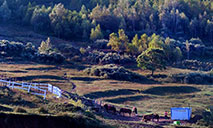COVID-19 origins tracing "much politicized" to check rise of China: Nepali paper
KATHMANDU, Sept. 29 (Xinhua) -- Science holds the key to origins tracing of COVID-19, an issue "much politicized" by some powerful countries, and the U.S. attempt to explore the origins of the coronavirus through its intelligence community has exposed its "ugly intention" to check the rise of China, according to a Nepali newspaper.
"Two years since the pandemic, as people in the world are trying to fight against and cope with the pandemic they have also developed an expectation and hope in science, which can only come up with an accurate and just response over the origins," wrote the article published on Sunday by Nepal Live Today, an English-language online newspaper.
"Unfortunately, some 'powerful' countries have been coming up with misinformation in regard to the origins of the virus. Without even waiting for scientists' conclusions, they have politicized the issue and created some sort of negative narrative against China," it said.
Referring to U.S. President Joe Biden's imposition of a 90-day deadline in May for American intelligence agencies to find out the origins of the virus, the article said, "Many international experts argued this was meant to harm the image of China."
The U.S. intelligence community released a report in late August, with "nothing specific" but reported disagreement among the intelligence agencies themselves, as "two different agencies came up with two different conclusions," it said.
"On the contrary, it exposed the ugly intention," the article observed. "It is an open secret now that the Western powers are bent on checking the rise of China. Baseless accusations on China can be taken as the latest such measure."
"The issue of virus origins has been much politicized," it said, adding that "No country has the right to put its own political interests above people's lives, nor should a matter of science be politicized for the purpose of slandering and attacking other countries," the article stressed.
Photos
Related Stories
- Full Text: China releases chronicle of international cooperation on WHO-convened Global Study of Origins of SARS-CoV-2: China Part
- In pics: production line of Chinese COVID-19 vaccine in Uzbekistan
- Chinese mainland reports 11 new locally transmitted COVID-19 cases
- "Call in Club" Tidbits: Why do some Westerners stockpile toilet paper during the COVID-19 pandemic?
- Cambodia receives new batch of 3 mln doses of China's Sinovac COVID-19 vaccine
Copyright © 2021 People's Daily Online. All Rights Reserved.










